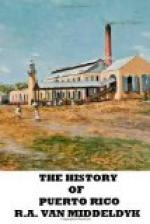FOOTNOTES:
[Footnote 45: They ceased altogether in 1810, as a result of the revolution in Mexico.]
[Footnote 46: Benefactores and Hombres Illustres de Puerto Rico, p. 289.]
CHAPTER XXIII
REVIEW OF THE SOCIAL CONDITIONS IN PUERTO RICO AND THE POLITICAL EVENTS IN SPAIN FROM
1765 TO 1820
After the conquest of Mexico and Peru with their apparently inexhaustible mineral wealth, Spain attached very little importance to the archipelago of the Antilles. The largest and finest only of these islands were selected for colonization, the small and comparatively sterile ones were neglected, and fell an easy prey to pirates and privateers.
Puerto Rico, notwithstanding its advantages of soil and situation, was considered for the space of three centuries only as a fit place of banishment (a presidio) for the malefactors of the mother country. Agriculture did not emerge from primitive simplicity. The inhabitants led a pastoral life, cultivating food barely sufficient for their support, because there was no stimulus to exertion. They looked passively upon the riches centered in their soil, and rocked themselves to sleep in their hammocks. The commerce carried on scarcely deserved that name. The few wants of the people were supplied by a contraband trade with St. Thomas and Santa Cruz. In the island’s finances a system of fraud and peculation prevailed, and the amount of public revenue was so inadequate to meet the expenses of maintaining the garrison that the officers’ and soldiers’ pay was reduced to one-fourth of its just amount, and they often received only a miserable ration.
His Excellency Alexander O’Reilly, who came to the Antilles on a commission from Charles IV, in his report on Puerto Rico (1765) gives the following description of the condition of the inhabitants at that time:
" ... To form an idea of how these natives have lived and still live, it is enough to say that there are only two schools in the whole island; that outside of the capital and San German few know how to read; that they count time by changes in the Government, hurricanes, visits from bishops, arrivals of ‘situados,’ etc. They do not know what a league is. Each one reckons distance according to his own speed in traveling. The principal ones among them, including those of the capital, when they are in the country go barefooted and barelegged. The whites show no reluctance at being mixed up with the colored population. In the towns (the capital included) there are few permanent inhabitants besides the curate; the others are always in the country, except Sundays and feast-days, when those living near to where there is a church come to hear mass. During these feast-days they occupy houses that look like hen-coops. They consist of a couple of rooms, most of them without doors or windows, and therefore open day and night. Their furniture is so scant that they can move in an instant. The country houses are of the same description. There is little distinction among the people. The only difference between them consists in the possession of a little more or less property, and, perhaps, the rank of a subaltern officer in the militia.”




